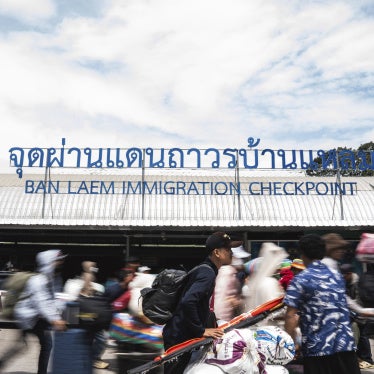(New York) -- The government of Thailand should refrain from forcibly returning any Burmese immigrants who may have a claim to refugee status, Human Rights Watch said today. The Thai government today initiated a campaign to round up and deport thousands of Burmese immigrants working in Thailand.
The Thai government should also guarantee access for the Office of the United Nations High Commissioner for Refugees (UNHCR) to screen any Burmese migrant who presents a claim to be a refugee.
"Thailand's campaign will put the lives of many Burmese at risk," said Joe Saunders, deputy director of Human Rights Watch's Asia Division. He noted that under customary international law, the Thai government has an obligation not to return anyone to a country where they have a well-founded fear of persecution. "The Thai government must ensure that it identifies and provides protection to those with a fear of persecution in Burma, before deporting any illegal immigrants," Saunders added.
The Thai government has begun to round up and deport some 600,000 migrants living in Thailand. But massive human rights violations persist in Burma, exposing some returnees to the threat of serious persecution. Domestic pressure on the Thai government to deport immigrant labor has increased in the wake of the July 1997 economic crash and increase in unemployment.
The Burmese army, under the direction of the ruling State Peace and Development Council (SPDC), continues to fight in areas adjacent to the Thai-Burma border against three main insurgent groups, the Karen National Union, Karenni National Progressive Party, and Shan State Army-South. The army commonly employs tactics of forced relocation of villagers, summary executions, and torture in its offensives. The United Nations Special Rapporteur on Burma, Justice Rajsoomer Lallah, in a report released last week wrote that he was "deeply concerned at the ongoing generalized human rights violations committed against the ethnic groups and other minorities in the eastern part of Myanmar [Burma]."
The widespread use of forced labor in Burma is also a cause of refugee flows. Officials demand up to fifteen days a month of uncompensated labor for infrastructure construction, portering and army camp maintenance. In July 1999, the International Labour Organization (ILO) effectively banned the Burmese government from partaking in its activities or benefiting from ILO programs because of the government's failure to end the practice of forced labor.
Human Rights Watch believes that members of the Shan ethnic minority are particularly at risk during the deportation sweeps. Fighting and forced relocation in central Shan State have driven as many as 100,000 villagers across the border since 1996. Unlike the Karen and Karenni ethnic minority groups, the Shan have no access to refugee camps and survive by seeking employment in the Thai labor market, particularly in Chiang Mai and Chiang Rai provinces. A round-up of migrant workers in these northern provinces would result in many Shan being returned to a dangerous situation in Burma. Human Rights Watch urged UNHCR to press the Thai government to ensure protection and assistance for all Shan refugees in Thailand.
UNHCR maintains a single officer at the Bangkok Immigration Detention Center to offer potential refugees the opportunity to identify themselves. Human Rights Watch urged UNHCR, in cooperation with Thai authorities, to assign officers in its three sub-offices on the Burmese border to identify and interview refugees and to designate staff to visit detention centers in provinces with large communities of Burmese workers, such as Chiang Mai, Chiang Rai and Ranong. In late 1998, Thailand granted UNHCR a permanent presence on the Thai border and greater access to more than over 100,000 refugees in camps there.
For Further Information:
Joe Saunders (New York) + 1 212 1207
Gary Risser (Washington) +1 202 612 4342
Urmi Shah (London) +44 171 713 1995








